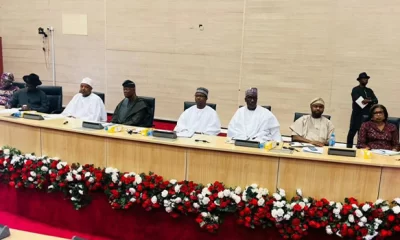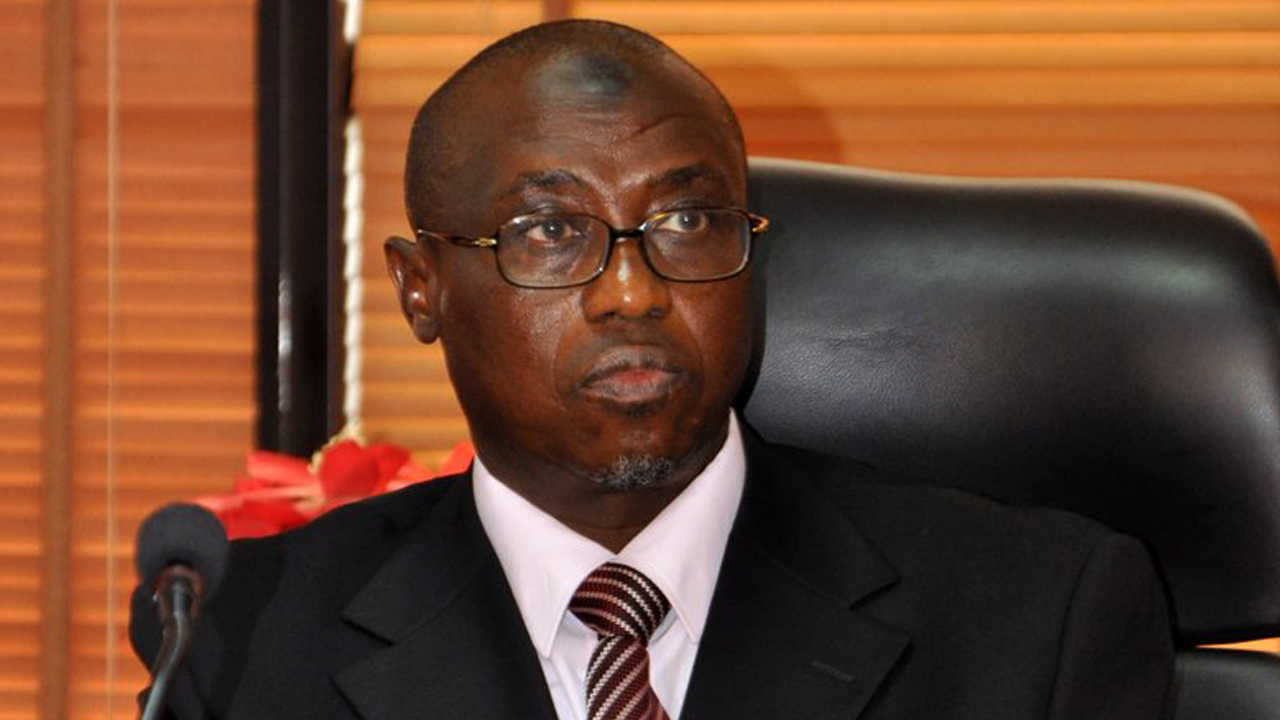Business
FG clarifies issues over NNPC’s US$3.3bn loan
Published
2 years agoon

The Federal Government has clarified certain issues over the $3.3 billion loan, procured by the Nigerian National Petroleum Company Limited, which the federal government tagged “PROJECT GAZELLE”.
The government clarified that the $3.3 billion crude oil pre-payment loan, known as Project Gazelle, is a financing agreement secured by NNPC Limited to prepay future royalties and taxes to Nigeria.
NNPC Limited/Office of Digital Communications and Engagement, The Presidency, making the clarifications, generated certain questions and answers on the workings of the $3.3 billion crude oil pre-payment loan.
the Presidency highlighted:
You Asked, We Explain: What You Need to Know about NNPC’s US$3.3bn Loan — PROJECT GAZELLE
by NNPC Limited/Office of Digital Communications & Engagement, The Presidency
There has been a lot of interest from the public and stakeholders in recent weeks regarding the $3.3 billion crude oil pre-payment loan, also known as Project Gazelle. This is a financing agreement secured by NNPC Limited to prepay future royalties and taxes to Nigeria.
Project Gazelle is a crude oil-backed, forward sale structured finance facility sponsored by NNPC Limited, which acts as the seller and sponsor. The facility involves the forward sale of a specific number of barrels of crude oil to a Special Purpose Vehicle (SPV), which has approached international financial institutions for the required funding. The proceeds from the forward sale will be available to NNPC Limited for use.
READ ALSO: Tinubu felicitates with Keyamo @ 54
To address the range of questions raised and prevent speculation, we have created this Frequently Asked Questions (FAQs) factsheet, which covers what you need to know.
FREQUENTLY ASKED QUESTIONS
Q1. How do Crude Oil Forward Sales Financing Agreements Work?
A1. Forward sale financing agreements for crude oil operate in the following way: An SPV (special purpose vehicle) enters into a forward sale agreement with the seller (in this case, NNPC Limited). The SPV then obtains financing from a bank or financial institution based on the agreed forward sale value of crude oil from NNPC Limited. This financing is often collateralised by the future crude oil itself.
NNPC Limited (the Seller) can then use the proceeds from the forward sale to finance its operations, including operational expenses, production costs, investments in new projects, and prepayment of taxes and royalties. The SPV can use the proceeds from the sale of the crude oil to meet its financing obligations with the Banks/Financing Institutions and return any excess from the final sales back to the original Seller (NNPC Limited).
Q2: Why was it called Project Gazelle, and why is NNPC Limited doing it?
A2. Project Gazelle is a structured crude oil-backed forward-sale finance facility sponsored by the Nigerian National Petroleum Corporation Limited (NNPC Limited). It is called Project Gazelle because that is the code name given to it. Under this project, NNPC Limited agrees to sell a predetermined quantity of future barrels of crude oil production in advance while securing upfront payment from a special purpose vehicle (SPV) backed by international financial institutions. This project provides immediate USD financing for NNPC Limited’s operational needs, including paying its tax and royalty obligations to Nigeria upfront.
Q3: How does this improve Nigeria’s foreign exchange inflow?
A3: By using the upfront funding, Nigeria can maintain the stability of its currency, the Naira, and increase its foreign exchange reserves. This can also be achieved by increasing oil production and exports, but due to current investment limitations, forward-sale contracts, such as the one used in NNPC Limited’s Project Gazelle, offer a more immediate solution. Forward-sale contracts enable resource-producing companies like NNPC Limited to receive significant upfront funding for new projects before production and export. The funding can then be used for investments in existing and future resources, leading to increased oil and gas production and higher exports, resulting in more dollars and foreign currencies entering the country.
International banks have a history of providing forward-sale financings, which can bring new foreign direct investments (FDIs) into Nigeria.
Q4: What is the Benchmark Price used, the quantity of Crude Earmarked, and How will the facility be repaid?
A4.1: Benchmark Pricing Strategy: Project Gazelle uses a conservative crude price of $65 per barrel to calculate the allocated crude to be produced and sold in the future. This provides a safety margin for price fluctuations in future.
A4.2: Earmarked Crude Quantity: NNPC Limited has reserved up to 90,000 barrels of crude for Project Gazelle, ensuring sufficient cash flow for repayment and other financial obligations. If oil prices rise, more money will come in from selling the 90,000 barrels, allowing for faster repayment. However, if oil prices fall, the repayment may be slower.
The quantity of crude earmarked (90,000 barrels) is sized to ensure enough cash is available for the repayment of the facility when it is due. This also ensures that NNPC Limited can meet other cash flow obligations, considering the expected future price of crude oil globally.
Let’s use a simple scenario to explain this: for example, let us assume a loan of $100 million was given to be repaid from 1 million barrels of future oil sales; the repayment would vary depending on the eventual price per barrel of crude oil. If the oil were sold at $150 per barrel, 1 million barrels would fetch $150 million, and the loan would be fully repaid with the excess proceeds going back to the crude oil seller. However, if the oil were sold at $60 per barrel, 1 million barrels would only fetch $60 million, and the loan repayment would be lower. (See table below)
Scenario Analysis Table (based on assumed scenarios for a $100m loan)
Scenario analysis using assumed estimates
Q5: Why is the crude price in this arrangement lower than the market price?
· A5: The lower crude price in this arrangement is due to the conservative pricing strategy that accounts for the volatility of oil prices. This strategy helps in reducing the risk of default and ensures financial stability. Oil prices are highly unpredictable, meaning prices can fluctuate up and down within any given period.
Lenders prefer a low price for safety to ensure a limited risk of default. On the other hand, Borrowers prefer a high price to minimise pledged volumes. The negotiated price sits in the middle and is usually a compromise between these two interests.
· NOTE: A portion of the revenues generated to cover costs before repaying the loan. A lower price estimate also accounts for these incidental costs.
Q7: What happens if sales proceeds exceed repayment amounts?
A7: As explained in the scenario in Q4 above, If the sales proceeds exceed the repayment amount, NNPC Limited will repay the original loan amount and the agreed-upon interest rate. In addition, any excess revenue from the crude sold at a higher amount will be paid back to NNPC Limited.
Q8: How might Project Gazelle affect Nigeria’s credit rating?
A8: It could be positive by expanding funding sources and increasing foreign reserves.
Q9: Will future government oil earnings be affected?
A9: The facility’s small size will not significantly impact future oil earnings relative to Nigeria’s oil production.
Q10: How are sales proceeds used on repayment dates?
A10: Prioritized use of sales proceeds includes financing costs, debt service, maintaining the DSRA balance, and prepaying the Facility with excess cash.
Q12: How do oil prices affect repayments?
A12: Repayments are tied to future export values. Higher oil prices mean faster repayments, while lower prices may slow them down.
CONCLUSION
Nigeria has over 35 billion barrels of proven reserves that are yet to be exploited, and these reserves can be used to raise the required funding, amongst other things, by utilising a forward sale financing. This strategy helps securitise Nigeria’s proven oil reserves, which can immediately improve the inflow of foreign currency rather than waiting for years. Forward-sale financing can significantly boost the availability of foreign currency for an oil/gas-dependent country by supporting more exports and bringing in overseas funding. This helps to improve the country’s ability to pay for imports and manage its overall economy. The forward-sale investments are repaid using the money earned from exports when they finally start by improving the country’s balance of payments, providing the government with more stable and predictable oil earnings, which helps in planning budgets and managing foreign exchange reserves.
NNPC Limited’s Project Gazelle is a forward-thinking financial strategy that aligns operational needs with broader economic goals by utilising future crude oil sales for immediate funding, enhancing liquidity, and contributing to Nigeria’s foreign exchange reserves. This project showcases NNPC Limited’s operational autonomy and financial acumen while ensuring immediate liquidity, minimising the impact on future earnings, and potentially enhancing Nigeria’s credit rating. The repayments are strategically planned and tied to future oil sales, with conservative pricing in oil sales contracts mitigating the risks associated with oil price volatility.
In line with the provisions of the latest PIA and NNPC Limited’s journey towards operational excellence and economic contribution as a Limited Liability Company, Project Gazelle balances immediate financial requirements with long-term sustainability.
You may like


Daily consumption of petrol drops from 66.6m litres to 46m litres – NNPC GMD


Nigeria to keep oil-for-fuel swap for another 3 years


Ministry denies knowledge of alleged NNPC’s $3.5bn subsidy fund


Looming increase of petrol pump price: NNPC denies impending price increase


Deregulate petroleum sector now, Obaseki advices FG
Trending

 Health5 days ago
Health5 days agoDeclassified CIA memo explored concealing mind-control drugs in vaccines

 Entertainment6 days ago
Entertainment6 days agoSimi addresses resurfaced 2012 tweets amid online backlash

 Crime5 days ago
Crime5 days agoSenior police officers faces retirement after Disu’s appointment as acting IGP

 Education7 days ago
Education7 days agoPeter Obi urges JAMB to address registration challenges ahead of exams

 Health7 days ago
Health7 days agoNAFDAC issues alert on suspected revalidated SMA Gold infant formula

 Comments and Issues6 days ago
Comments and Issues6 days ago20 Critical Fixes to Save Nigeria’s Democracy from Electoral Fraud

 Football6 days ago
Football6 days agoMartínez ruled out of Everton clash with calf injury

 Latest6 days ago
Latest6 days agoICPC yet to respond to El-Rufai’s bail request as arraignment date looms

